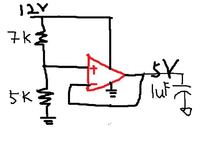TheSniper
Member level 3

clipping circuit
Hey guys,
Its been while for me, and it sure feels great to be back,
I sure need some help I am trying to design a clipping circuit from 12 volts input clipped down to 5 volts using lm-324 OP-AMP.
I am trying to design a clipping circuit from 12 volts input clipped down to 5 volts using lm-324 OP-AMP.
Really appreciate the help
The Sniper (+)
Hey guys,
Its been while for me, and it sure feels great to be back,
I sure need some help
Really appreciate the help
The Sniper (+)






